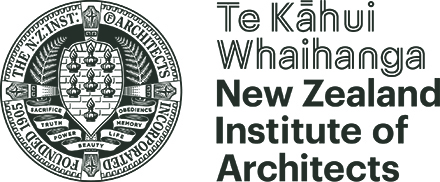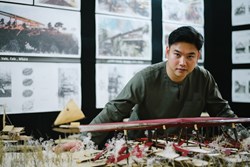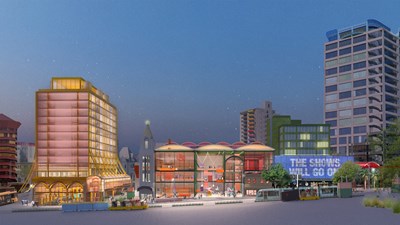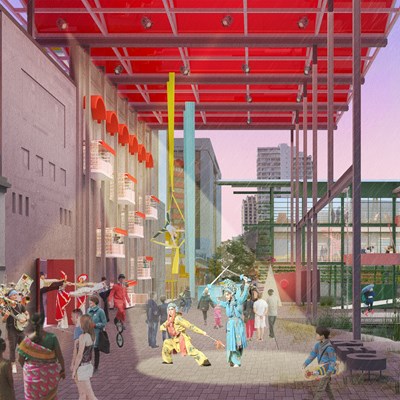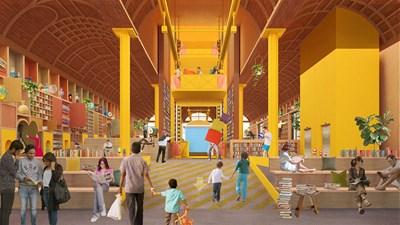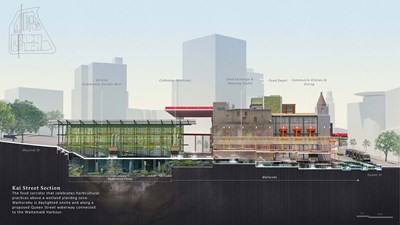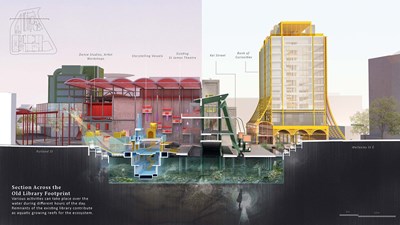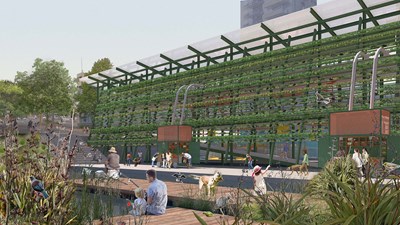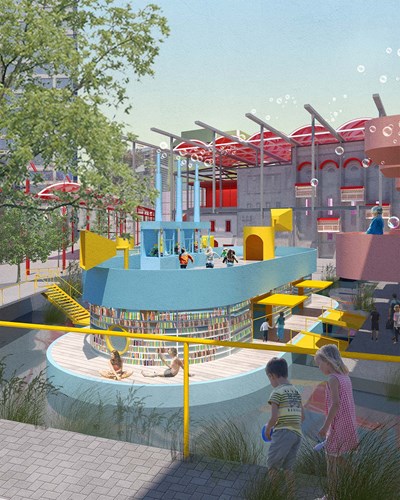Cindy Huang of Waipapa Taumata Rau, the University of Auckland School of Architecture and Planning, is highly commended for her project 'Library-City'.
Project description
Tāmaki Makaurau Auckland’s central city is suffering social depletion and devitalisation due to a pandemic and the new remaking and commercialisation of civic life at its waterfront. Library-City seeks to revitalise and re-socialise public urban space at the intersection of the city’s learning and entertainment quarters.
Counter to the neo-liberal orchestration of desires through consumption, the project seeks to catalyse greater social performativity and citizenry agency through the nexus of learning. Revising an older modernist project for a ‘civic centre’ for the city, Library-City imagines a centrifugal urban intervention that takes the Central City Library as its pivot. Spun outward, it proposes a revised typology and operation for libraries—one that radicalises the institutional framework around collecting and managing knowledge by amplifying a lending ethos in favour of diversified social learning and variable plays in knowing.
To better grasp this translational potential and the library’s radicalisation, a series of operating devices or ‘machines’ were devised. These in turn were ‘set in motion’ across the urban block and broader city terrain, a mobilisation giving rise to synergistic interventions drawing together neglected buildings inclusive of the St James Theatre, the ASB tower and a demolished cinema complex (Lido, Odeon and Regent theatres).
Learning and its translational potential on one hand, reverse the city’s occlusion of the hydrological network, bringing to surface the play of waterways associated with Waihorotiu. On the other, learning machines opportunistically plug into the proposed light rail network channelled through Queen Street, thereby potentially seeding counter-social performativity and learning agency across the city and Isthmus.
Jury citation
The commercialisation of civic life and the ongoing effects of the pandemic have resulted in an Auckland city hollowed out by corporate interests. What is left of free and accessible public space in the city when neoliberal agendas have conspired to dominate it? The downtrodden Auckland Central Library, the near-abandoned St James Theatre and the faded ASB tower provide the site for a radical rethink of mid-city that includes an ambitious plan to daylight the Wahorotiu stream and build a network of spaces, systems, communities and opportunities above.
The library building itself is replaced by a revised typology and purpose for libraries—one that radicalises the institutional framework around collecting and managing knowledge, and reorients it towards social learning, a social-structural catalyst for shared knowledge, activism, civic engagement and the democratisation of public space. Its footprint is enlarged by the deployment of social knowledge ‘machines’, widgets that can be sent out into the city to reclaim its spaces. From mobile cinemas to agricultural shells, these machines are tools for learning that can be plugged into the urban network and used to rewire it for the better.
Above a reinstated and consolidated wetland ecosystem, a series of porous programmatic corridors foster community connection and knowledge sharing. Kai Street acknowledges plethora of food knowledges and practices; the Common Room is a community kitchen and public dining space; the Bank of Curiosities is both a repository and discovery space, like a shared memory bank.
This detailed and intricate, yet compelling and powerful project is joyful, uplifting and inspiring, but it also solves a problem: the cultural void of central Auckland. Firmly rooted in its site, carefully considered, and enlivened by a clear-eyed understanding of where we are as a city and a country, Library-City provides a vision of a place we want to live in right now. Someone call the Mayor.
